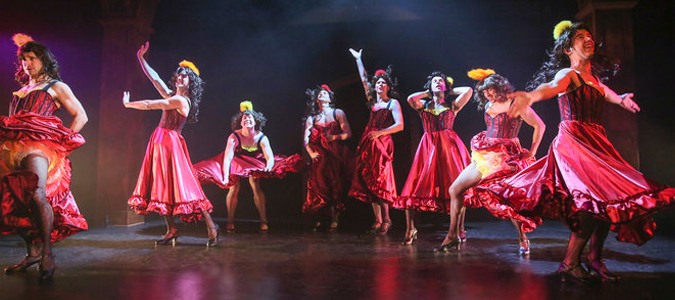

The Underclassman
Opening Night: November 19, 2014
Closing: November 30, 2014
Theater: Duke on 42nd Street
1915. Brilliantly talented, young F. Scott Fitzgerald is swept into the hierarchy of Ivy League society and the antics of the Princeton Triangle Club, in pursuit of the beautiful and elusive debutante Ginevra King. Their romance inspired one of the greatest novels of the 20th century.
BUY TICKETSREAD THE REVIEWS:
November 19, 2014
Before Scott and Zelda there was Scott and Ginevra, she being one of Chicago’s “Big Four” debutantes during World War I, when F. Scott Fitzgerald was a Princeton undergraduate and Ginevra King was at the posh Westover School in Connecticut. Their romance, much of it epistolary, was doomed by class and financial differences, but it became fodder for Fitzgerald’s writing, including his novel, This Side of Paradise (1920), and The Great Gatsby, where Ginevra was probably Daisy Buchanan’s prototype. Using This Side of Paradise as their primary source, but mingling it with biographical material, Cara Reichel (book/direction) and her husband, Peter Mills (book/lyrics/music), recount the Scott-Ginevra affair in the ironically titled The Underclassman, the Prospect Theater Company’s ambitious and often surprisingly refreshing musical that looks at social class, friendship, and an all-male Princeton in the 1910s. License has been taken, but most characters bear the names of actual persons, including Scott’s friends, Edmund “Bunny” Wilson (Billy Hepfinger, imposing) and John Peale (“J.P.”) Peale (Marrick Smith, capable), both later famous men of letters. The show, a decade in development, and given a 2005 production as The Pursuit of Persephone, remains imperfect, but has much to recommend it.
READ THE REVIEWNovember 19, 2014
Who knew that the great American novelist F. Scott Fitzgerald began his literary career in musical theater? According to Prospect Theater Company’s newest offering, The Underclassman, a musical based on Fitzgerald’s debut novel This Side of Paradise, the stage was all that the strapped sophomore had on the brain. That, and Ginevra King — a debutante extraordinaire whose romantic relationship with the young writer served as inspiration for his Great Gatsby socialite, Daisy Fay Buchanan. The musical is now running at the Duke on 42nd Street. Composer Peter Mills has built a score fit for the famous wordsmith, with clever lyrics and timely melodies that capture Fitzgerald’s playful and posh surroundings as a Princeton undergrad in the early 20th century. We meet Fitzgerald in 1915, his second wasted year as an Ivy Leaguer and member of Princeton’s cross-dressing musical-comedy troupe, the Triangle Club. So far his education has amounted to nothing more than a pile of blue failing notices that he cavalierly collects while waiting for some kind of life-shaking joy or sorrow to inspire the literary masterpiece he knows he has inside of him. Soon enough, at a dance following a Triangle performance, both sides of this coin come to him in the glamorous package of the aforementioned Ginevra King — a “top four debutante” of her day known to college boys far and wide as single and ready to mingle. What begins as a romantic game winds up a powerful love connection, verging on obsession for Fitzgerald.
READ THE REVIEWNovember 19, 2014
Edmund Wilson, what a sweetheart! Seems that before he became a pre-eminent literary critic, he was a really swell guy, a hell of a pal. That’s one of the surprising tidbits in The Underclassman, Prospect Theater Company’s ultra-adorable, suitably tuneful and somewhat flat musical adaptation of F. Scott Fitzgerald’s 1920 novel, This Side of Paradise. Another is an all-male cancan number. Peter Mills, the writer-composer, and Cara Reichel, who directed and also contributed to the book, have created a pre-Jazz Age cocktail — two parts Fitzgerald’s autobiographical novel, one part Fitzgerald’s actual biography, stirred with plenty of artistic license. Don’t look for much of a twist — or much of a plot. It’s not until the top of Act II that Scott (an ardent Matt Dengler) can crow, “At last, something had happened!” On a mostly bare set, with arches evoking Princeton’s ivied halls and an orchestra stuffed into a loft like so many pigeons, young Scott dreams of love, literature and social success. Though a lowly sophomore, he has joined the ranks of the Triangle Club, whose members write and perform musical revues. Scott is angling to pen Triangle’s next show, a privilege not usually afforded to underclassmen.
READ THE REVIEW



















